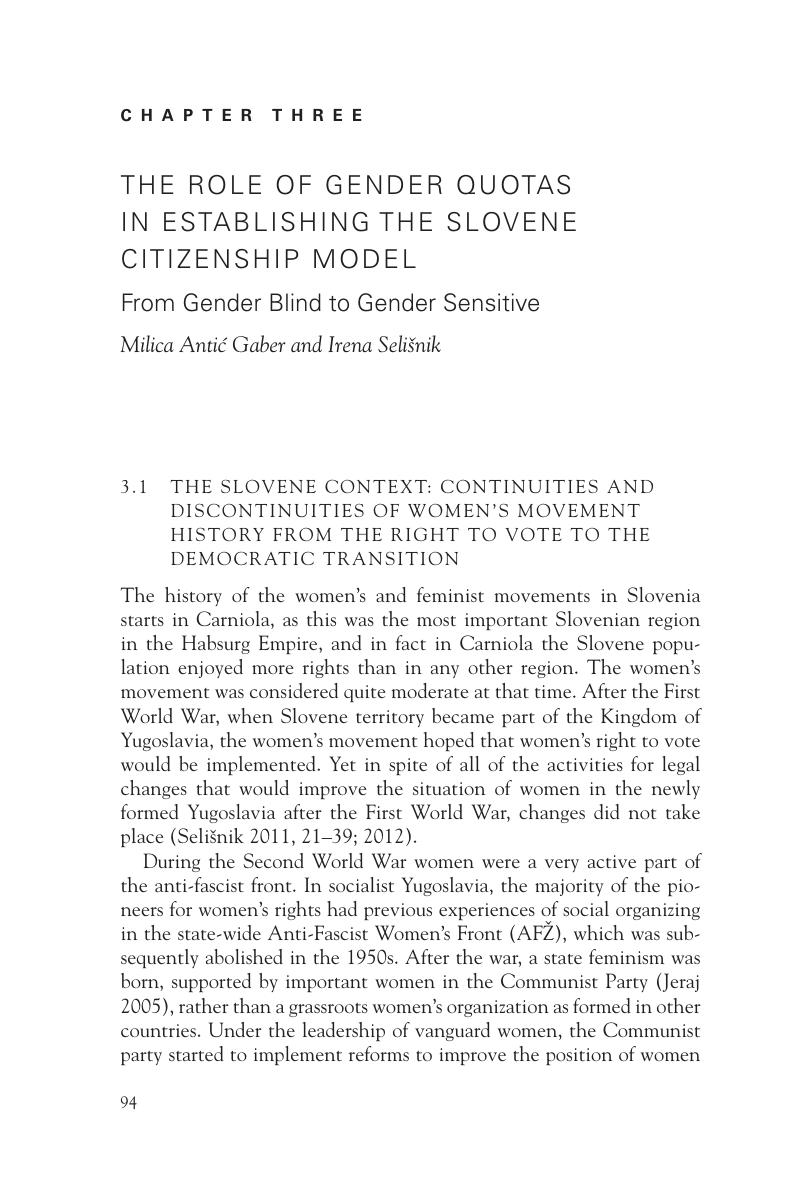From Gender Blind to Gender Sensitive
from Part I - Gender Quotas As Transformative Equality Remedies
Published online by Cambridge University Press: 21 July 2018

283-III Stališče PS ZLSD 08.01.2003 [PS ZLSD] / position PS ULSD 01/08/2003 [PS ULSD]
365-III Predlogi stališč poslanske skupine Nove Slovenije do osnutkov ustavnih zakonov, 27 November 2003 / Position PS NSi to the proposal to initiate the procedure for amending the Constitution of the Republic of Slovenia to the draft constitutional Law 27 November 2003 [NSi – New Slovenia group]
365-III Zapis javne predstavitve mnenj za vsebinsko zaokroženi sklop “Spodbujanje enakih možnosti kandidiranja moških in žensk” 28 October 2002 [30 – Ustavna komisija]
701-III Stališče poslanske skupine DeSus 23 December 2003 [PS DeSus] / position of DeSUS deputy group to proposals for the initiation of procedures for constitutional amendments, 24 November 2003 [DeSUS – group of the Democratic party of pensioners]
Constitutional Act Amending Article 68 of the Constitution of the Republic of Slovenia
Available at: www.dijaski.net/gradivo/soc_ref_zenske_v_slovenski_politiki_01?r=1
Available at: www.rtvslo.si/slovenija/visje-zenske-kvote-le-postopno/39092
Law on Equal Opportunities for Women and Men
National Assembly Elections Act
Magnetogram strokovnega posveta Komisije DZ RS za politiko enakih možnosti 1998. Državni zbor, 12 May 1998 / Transcription of the expert consultation of Comission DZ RS for politics on equal opportunity 1998.
Poročilo o delu Komisije državnega zbora RS za žensko politiko za obdobje 1993–6. Ljubljana 1996 / Report on the work of the NA Commission for Women's Politics in the period 1993–6. Ljubljana, 1996.
Poročilo Strokovne skupine k predlogu za začetek postopka za spremembo 44. člena Ustave Republike Slovenije (Spodbujanje enakih možnosti kandidiranja moških in žensk na volitvah), 18 September 2002 [Dr Alenka Šelih, članica Strokovne skupine]/Report of the Expert group to the proposal to initiate the procedure for amending Article 44 of the Constitution of the Republic of Slovenia (Promoting equal opportunities for men and women stand elections), 18 September 2002 [Dr Alenka Šelih, State Expert Group]
The Proposal to Initiate the Procedure for Amending the Constitution of the Republic of Slovenia
Recording of hearings for the main parts “Promoting equal opportunities for men and women stand,” 28 October 2002
Slovenian Press Agency (2003) V Evropskem parlamentu za večje število poslank. Available at: www.sta.si/747323/v-evropskem-parlamentu-za-vecje-stevilo-poslank
Slovenian Press Agency (2004) DZ(34/2): Ženske kvote ustavno sporne? Available at: www.sta.si/810520/dz-34-2-zenske-kvote-ustavno-sporne
Zapisniki sej državnega zbora / Stenographic Records of National Assembely
Zapisniki sej odbora za notranjo politico in pravosodje / Transcriptions of the Sessions of the Committee for Internal Affairs and Legislation
1095-III POROCˇČILO k predlogu zakona o spremembah in dopolnitvah zakona o volitvah poslancev iz Republike Slovenije v Evropski parlament (ZVPEP-A) / Report on Changing the Law for Election to the European Parilament
365-III Zapis javne predstavitve mnenj za vsebinsko zaokroženi sklop “Spodbujanje enakih možnosti kandidiranja moških in žensk” 28.10.2002 / Recording of hearings for the main parts, “Promoting equal opportunities for men and women stand,” 28 October 2002 [30 – Constitutional Commission]
365-III Predlog za začetek postopka za spremembo Ustave Republike Slovenije z osnutkom ustavnega zakona / The Proposal to start the process to change the Constitution of RS with the draft of the Constitutional Law. Ženski lobi Slovenije. Leaflet Odločajmo skupaj, supplement to the Delo newspaper, 3 July 2009. See: https://5050campaign.files.wordpress.com/2009/03/zenski-lobi-2009–2702–1.pdf
To save this book to your Kindle, first ensure [email protected] is added to your Approved Personal Document E-mail List under your Personal Document Settings on the Manage Your Content and Devices page of your Amazon account. Then enter the ‘name’ part of your Kindle email address below. Find out more about saving to your Kindle.
Note you can select to save to either the @free.kindle.com or @kindle.com variations. ‘@free.kindle.com’ emails are free but can only be saved to your device when it is connected to wi-fi. ‘@kindle.com’ emails can be delivered even when you are not connected to wi-fi, but note that service fees apply.
Find out more about the Kindle Personal Document Service.
To save content items to your account, please confirm that you agree to abide by our usage policies. If this is the first time you use this feature, you will be asked to authorise Cambridge Core to connect with your account. Find out more about saving content to Dropbox.
To save content items to your account, please confirm that you agree to abide by our usage policies. If this is the first time you use this feature, you will be asked to authorise Cambridge Core to connect with your account. Find out more about saving content to Google Drive.